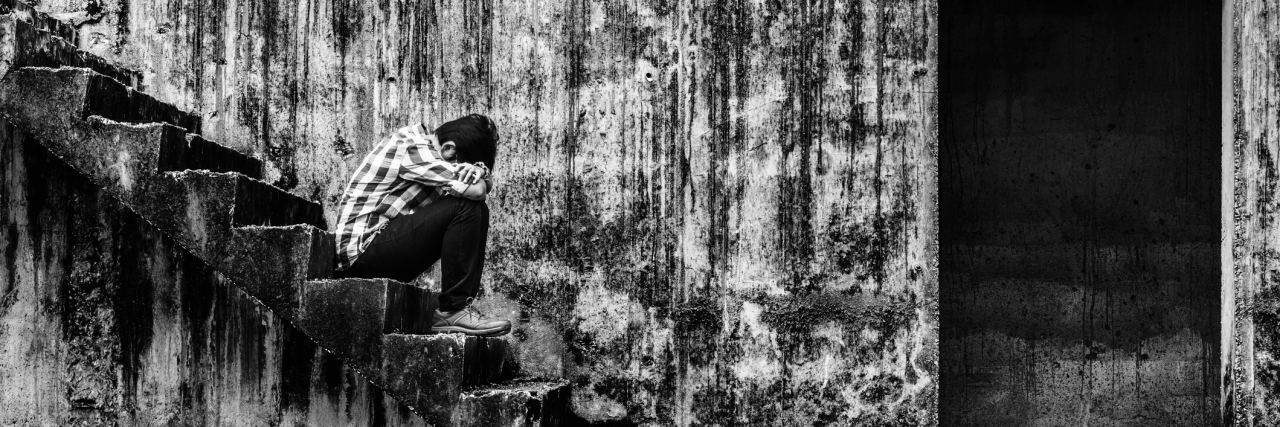I love when people ask me how I cope. I want to share what works for me, in the hope that it will work for them, but it worries me when friends ask, “How did you get over your depression.:
In short: I didn’t.
Depression is my roommate.
We live together, most days in harmony. But like any roommate you’ll ever have, Depression has her triggers. Some days I have no idea what sets her off, but she turns into a b*tch, tearing my life down, brick by brick, until my foundation is laid bare. Then there is just the very bottom of me.
Two legs left to stand on.
What do I do next?
That is up to me, and I had to make the choice about what to do when I was not in an episode. (For those of you who don’t know my story, I am a bipolar manic depressive, diagnosis in early childhood, non-medicated since the age of 22.)
I wake up every single day and put my feet on the floor and ground myself. I am consistent with my alarm, showering on the same days, trying to get my mileage in (or a small workout, at least, to get my serotonin up). I laugh at the thought that the rigidity of my schedule, which is actually pretty lax in terms of timing or specific action, is like me tiptoeing around this total prick who lives within me.
Depressed Chelley.
Like an abusive relationship, I fear triggering her. Not knowing those triggers makes it even harder to cope, but it is possible.
Please know: Medication is not evil. It is a wonderful tool in your arsenal of battling depression. A psychologist you click with is a wonderful tool, but like medication, you may need to try a few. These things are not automatic. These tools will not just click into place and magically bring you happiness.
They just won’t.
The biggest change, which may come after you’ve gotten a good medication and/or a good psychologist, needs to come from you. You need to take control.
Depression is a brain disorder. Depression is not sadness. Depression is not anger. Depression is not “crazy.” And depression feeds off alone. You need a team. People who have been on my team, currently, or in the past include:
- Psychiatrist
- Psychologist
- Close family
- Friends, an inner circle
- An emergency contact
- A hotline
The psychiatrist and psychologist are obvious. Your emergency contact needs to be someone you can call when you’re at the end. A hotline… yes, one of those help hotlines… they save lives. But family? Friends?
Yes.
You need to let people in.
Asking for help is necessary. This is not shameful. This is not your fault. This is not anyone’s fault. This is a disease that needs treating, and like all diseases, even when it lies dormant, it’s still there.
You can do this. You can change your battle with depression.
But you may never get over it.
Like your hair, eye color and family history, depression may be a part of you. I view it as a part that makes me unique.
I didn’t get over my depression. Depression actually lives with me. It’s my roommate, and we’ve learned to live with each other. Most days, we don’t even pass each other in the halls of this house, but some days, the worst days, when it creeps into my body, my temple… I call on my team.
My mother answers the phone at all hours. She learned when I was young I needed her, and I always would. My husband and I have a code called the two-call. If I call two times in a row, even if his answering means he loses his job, he must answer (plus, his boss is pretty cool).
And I keep a list of friends to call all on one-click on my cell phone. Five friends I know live close-by, have experience with the kids if I need help, and can come. My list is five deep — those five people are my lifeline to sanity, should I ever need it (which I have not in recent years).
Make the decision when you go to bed that tomorrow will be OK. It doesn’t have to be great — how cool would it be if it was?! What if every day was great? It would be amazing, that’s what.
And your days can all be great. But you need to plan for OK. Every day should be OK. And you can get there. I want to be your light if you feel like your own has blinked out. If you feel like you don’t have a support, reach out.
Depression is my roommate, but she is not my ruler.
Follow this journey on A is For Adelaide.
If you or someone you know needs help, visit our suicide prevention resources page.
If you need support right now, call the Suicide Prevention Lifeline at 1-800-273-8255.
Image via Thinkstock.

